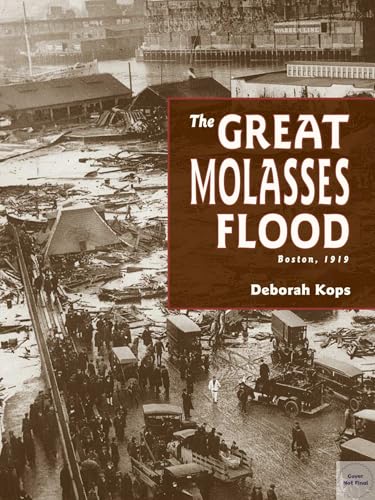The Great Molasses Flood
Boston, 1919
Deborah Kops
BOOK REVIEW

In the heart of Boston lies a tale so bizarre and tragic that it feels like a fever dream pulled straight from a madman's imagination-a monumental disaster that forever changed the fabric of a once-bustling city. The Great Molasses Flood: Boston, 1919 by Deborah Kops pulls you into this tumultuous event where sweet syrup turned deadly, embodying the chaos and unforeseen consequences of industrialization in an era fraught with ambition.
On one fateful January day, an enormous tank filled with 2.3 million gallons of molasses erupted, unleashing a viscous tidal wave that swept through the streets at a staggering pace of 35 miles per hour. The imagery is chilling; you can almost smell the thick sweetness turn rancid as it engulfs unsuspecting citizens, horses, and buildings alike. Kops recounts this catastrophe with an artistry that captivates the senses, evoking raw emotions as you feel the heart-wrenching panic of those caught in the sticky embrace of disaster. This is not merely a recounting of events; it is an invitation to reflect on the hubris of humanity when faced with the powers we dare to manipulate.
Set against the backdrop of post-World War I America, the narrative serves as both a historical account and a poignant reflection on the age of industrial expansion-one that walks the tightrope between progress and peril. Kops deftly weaves in cultural and social tensions of the time; the immigrant laborers, whose lives were molded by relentless work and economic uncertainty, are brought to the forefront. Their stories, often overlooked in mainstream narratives, resonate with the struggle of the working class-an echo of today's ongoing quest for justice and recognition.
Reviews from readers paint a vivid picture of their emotional rollercoaster while devouring this rich narrative. Some laud it as an essential lesson in history, combining tragedy with the moral responsibility of industrial civilization, while others highlight how it evokes a dark sense of foreboding akin to a thrilling disaster film. Yet, amid the acclaim, some skeptics argue that the tale's more grotesque elements overshadow the serious implications of such a disaster, leaving readers tangled in a web of fear and fascination.
The Great Molasses Flood has had its fingerprints on various pop cultural tales and disaster discussions since its occurrence. Authors and filmmakers have long used it as a metaphor for unexpected calamity born from human error and neglect. It's a shocking reminder that the sweetness of progress can often turn rancid, leaving devastation in its wake. Yet, Kops challenges you to not only understand the flood but also to reflect upon your world. How often do we push boundaries for the sake of convenience, only to face monstrous consequences?
Though this book may seem targeted at younger readers, its depth transcends age. The rich narrative and emotional weight have the power to inspire in anyone the need for awareness and accountability in the face of sweeping change. Experience it for yourself, and you may find your perspective forever altered-sharpened by the sticky horrors of the past, yet emboldened to advocate for a better future. As you delve into the tumult of The Great Molasses Flood, don't just absorb the story; immerse yourself in its lessons and interrogate your place within the flow of modernity. 💥
📖 The Great Molasses Flood: Boston, 1919
✍ by Deborah Kops
🧾 112 pages
2015
#great #molasses #flood #boston #1919 #deborah #kops #DeborahKops